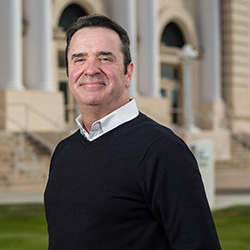|
Paul Standley, PhD |
 |
Brief Bio
Dr. Standley is a professor in Basic Medical Sciences and Physiology, co-director of the Cardiovascular-Hematology (CVH) Block, and is the former associate dean of Curricular Affairs and Program Evaluation. He trained under James Sowers, MD (internationally renowned endocrinologist) as a vascular physiologist at Wayne State University School of Medicine in Detroit, Michigan and earned his PhD in 1992.
His first faculty appointments were in the Departments of Physiology and Internal Medicine, where he continued his work investigating the vascular effects of insulin and its actions as a calcium channel blocking agent. Upon his arrival to Arizona in 1996, he helped found and develop a new innovative medical physiology curriculum at Midwestern University. During his tenure at MWU, his research gained new focus in the field of biophysical regulation of gene expression in vascular smooth muscle. In 2006, Dr. Standley was recruited to the University of Arizona College of Medicine – Phoenix to help found its new medical school track. He also holds appointments as a professor at Arizona State University’s School of Life Sciences and A.T. Still University.
Dr. Standley follows a student-centric philosophy and takes great passion in helping mentor individuals to pursue advancement and excellence in their educational goals. He has taught medical students in all disciplines of medical physiology for 25 years. In 2009, he was awarded both the Virginia and Vernon Furrow Award for Excellence in Basic Science Teaching for Medical Students and Outstanding Teaching by a Professor – Class of 2012. Dr. Standley also shares a strong passion for research. He received the 2006 Irvin M. Korr National Research Award for Outstanding Basic Science Researcher and the 2008 George W. Northup Award in Medical Writing – JAOA Research Paper of the Year. He is a member of several professional organizations including the American Physiological Society and the International Association of Medical Sciences Educators. His current funded research focuses on the biomechanical regulation of gene expression and cell growth in bioengineered tendons, bioengineered fascia and skeletal muscle cells.